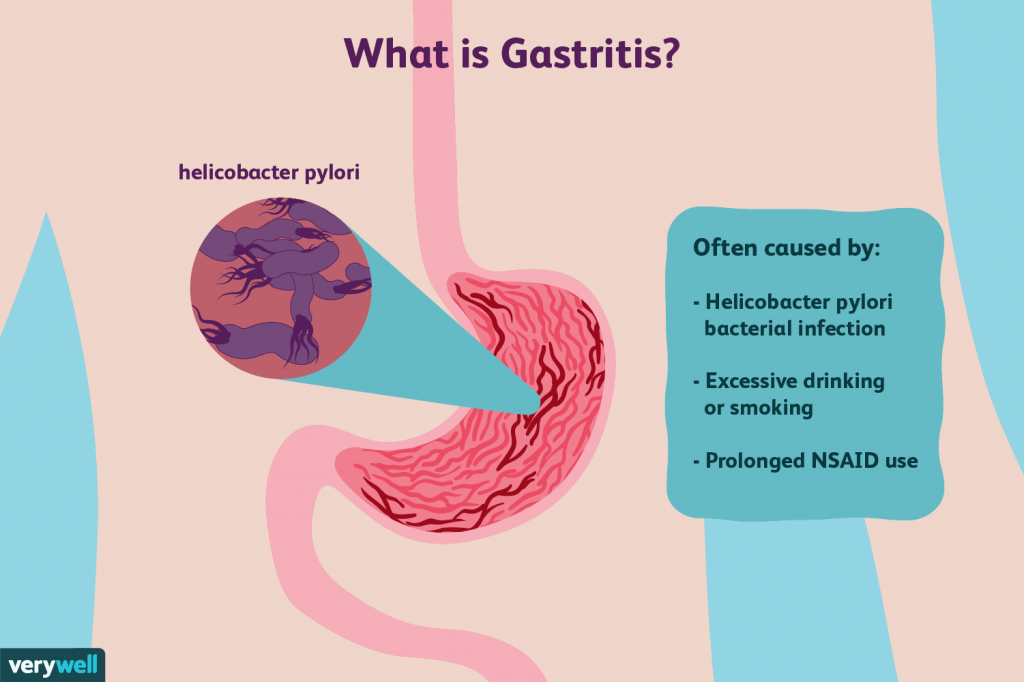
Overview
Gastritis is a general term for a group of conditions with one thing in common: inflammation of the lining of the stomach. The inflammation of gastritis is most often the result of infection with the same bacterium that causes most stomach ulcers. Regular use of certain pain relievers and drinking too much alcohol also can contribute to gastritis.
Gastritis may occur suddenly (acute gastritis), or appear slowly over time (chronic gastritis). In some cases, gastritis can lead to ulcers and an increased risk of stomach cancer. For most people, however, gastritis isn’t serious and improves quickly with treatment.
Symptoms
The signs and symptoms of gastritis include:
- Gnawing or burning ache or pain (indigestion) in your upper abdomen that may become either worse or better with eating
- Nausea
- Vomiting
- A feeling of fullness in your upper abdomen after eating
Gastritis doesn’t always cause signs and symptoms.
When to see a doctor
Nearly everyone has had a bout of indigestion and stomach irritation. Most cases of indigestion are short-lived and don’t require medical care. See your doctor if you have signs and symptoms of gastritis for a week or longer. Tell your doctor if your stomach discomfort occurs after taking prescription or over-the-counter drugs, especially aspirin or other pain relievers.
If you are vomiting blood, have blood in your stools or have stools that appear black, see your doctor right away to determine the cause.
Causes
Gastritis is an inflammation of the stomach lining. Weaknesses or injury to the mucus-lined barrier that protects your stomach wall allows your digestive juices to damage and inflame your stomach lining. A number of diseases and conditions can increase your risk of gastritis, including Crohn’s disease and sarcoidosis, a condition in which collections of inflammatory cells grow in the body.
Risk factors
Factors that increase your risk of gastritis include:
- Bacterial infection. Although infection with Helicobacter pylori is among the most common worldwide human infections, only some people with the infection develop gastritis or other upper gastrointestinal disorders. Doctors believe vulnerability to the bacterium could be inherited or could be caused by lifestyle choices, such as smoking and diet.
- Regular use of pain relievers. Common pain relievers — such as aspirin, ibuprofen (Advil, Motrin IB, others) and naproxen (Aleve, Anaprox) — can cause both acute gastritis and chronic gastritis. Using these pain relievers regularly or taking too much of these drugs may reduce a key substance that helps preserve the protective lining of your stomach.
- Older age. Older adults have an increased risk of gastritis because the stomach lining tends to thin with age and because older adults are more likely to have H. pylori infection or autoimmune disorders than younger people are.
- Excessive alcohol use. Alcohol can irritate and erode your stomach lining, which makes your stomach more vulnerable to digestive juices. Excessive alcohol use is more likely to cause acute gastritis.
- Stress. Severe stress due to major surgery, injury, burns or severe infections can cause acute gastritis.
Your own body attacking cells in your stomach. Called autoimmune gastritis, this type of gastritis occurs when your body attacks the cells that make up your stomach lining. This reaction can wear away at your stomach’s protective barrier.
Autoimmune gastritis is more common in people with other autoimmune disorders, including Hashimoto’s disease and type 1 diabetes. Autoimmune gastritis can also be associated with vitamin B-12 deficiency.
- Other diseases and conditions. Gastritis may be associated with other medical conditions, including HIV/AIDS, Crohn’s disease and parasitic infections.
Complications
Left untreated, gastritis may lead to stomach ulcers and stomach bleeding. Rarely, some forms of chronic gastritis may increase your risk of stomach cancer, especially if you have extensive thinning of the stomach lining and changes in the lining’s cells.
Tell your doctor if your signs and symptoms aren’t improving despite treatment for gastritis.
Prevention
Preventing H. pylori infection
It’s not clear how H. pylori spreads, but there’s some evidence that it could be transmitted from person to person or through contaminated food and water. You can take steps to protect yourself from infections, such as H. pylori, by frequently washing your hands with soap and water and by eating foods that have been cooked completely.
